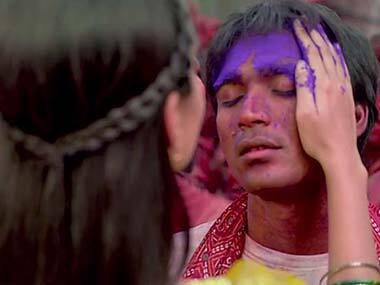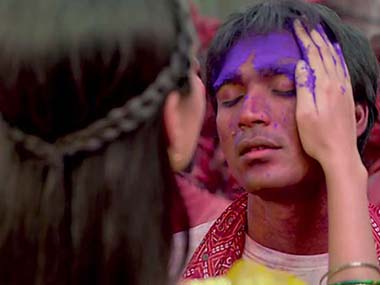Even though Bollywood has come to mean Indian cinema all over the world, at home most of us know that it’s a term for movies that are proudly mainstream and commercial. Eros International Media, however, would have you believe things are changing. Eros’s chief financial officer, Kamal Jain has said that the company felt content-driven, medium-budget films were the ones to back. In an
interview
to CNBC-TV18, Jain said, “In the last one year, we focused on supporting films high on content, small-to-medium in budget and distributed them worldwide. After Vicky Donor, English Vinglish, Ranjhana [sic] has been a good success.” Jain clarified in his interview that ultimately, the producer makes approximately 52.5 percent of collections as revenue, after paying taxes, the distributors and exhibitors. According to Jain, Raanjhanaa has made an average gross collection of Rs 50 crore in India so far. But hold on to the pom-poms and don’t bring the cheerleading outfits out yet. This is how Jain described Raanjhanaa’s success in the interview: “The film’s box office, it is phenomenal given that the budget was medium and the cast is relatively new.” [caption id=“attachment_907023” align=“alignleft” width=“380”]
 Raanjhanaa has made an average gross collection of Rs 50 crore in India so far. Image from IBN-Live[/caption] Leaving aside the question of whether or not cast qualifies as “new”, Raanjhanaa’s budget was
reportedly Rs 35 crore
, which is not a medium-sized number. It is, by any estimation, a rather large amount. Bollywood trade analyst Taran Adarsh wrote in
this piece
celebrating Raanjhanaa’s box office haul that the film was “expensive” and estimated the budget to be in the “Rs 30 cr range”. To put this in perspective, Yeh Jawaani Hai Deewani — starring two of Bollywood’s shiniest stars and a well-known supporting cast — cost
approximately Rs 40 crore
to make. It is true that both Vicky Donor and English Vinglish were honest-to-goodness small to medium budget films that did well at the box office. Vicky Donor
was made for Rs 7 crore and really had nothing but its story to power its success. English Vinglish
’s budget is estimated at approximately Rs 15 crore. The success of these two, as well as films like Kahaani, Paan Singh Tomar and Ishaqzaade, may have given rise to a wave of optimism among some in the Bollywood fraternity. Aashiqui 2, made on a budget of about Rs 9 crore and a recent entrant into the Rs 100 crore club, is the most recent example of a small film making it big. However, it’s worth keeping in mind that such hits always come as a surprise. To deduce from this that the emphasis is upon content would be optimistic. Rarely do producers pick a film whose central strength is story over a star-backed title. Why? Because the numbers inevitably favour the titles touted as blockbusters. They have the stars, it’s easier to publicise such films, there are more brands that want to be affiliated with them and (unless it’s an exception like Himmatwala) drawing audiences is less of a challenge for big budget films. So far this year, Aashiqui 2 and three other films have made Rs 100 crore or more: Race 2, Vishwaroopam and YJHD — all big budget, multi-starrer films. In 2012, not one of the
nine films
that made the Rs 100-crore club threw up any new names or faces. Luck and producers favour the stars, it seems. It’s worth keeping in mind though that a low-budget film doesn’t need to make Rs 100 crore to become a hit. That pressure is only felt by the big-budget gang. For producers, just as there’s nothing more painful than a potential blockbuster crashing out of the box office, there’s also nothing sweeter than low investment yielding high rewards. Of late, we’ve seen a number of modest films earn their money back from the box office, which means it’s a little easier to get producers and stars to listen to a script that tells a story. Now to see whether this trend will throw up some new talent and whether Bollywood will be able to nurture that talent.
Raanjhanaa has made an average gross collection of Rs 50 crore in India so far. Image from IBN-Live[/caption] Leaving aside the question of whether or not cast qualifies as “new”, Raanjhanaa’s budget was
reportedly Rs 35 crore
, which is not a medium-sized number. It is, by any estimation, a rather large amount. Bollywood trade analyst Taran Adarsh wrote in
this piece
celebrating Raanjhanaa’s box office haul that the film was “expensive” and estimated the budget to be in the “Rs 30 cr range”. To put this in perspective, Yeh Jawaani Hai Deewani — starring two of Bollywood’s shiniest stars and a well-known supporting cast — cost
approximately Rs 40 crore
to make. It is true that both Vicky Donor and English Vinglish were honest-to-goodness small to medium budget films that did well at the box office. Vicky Donor
was made for Rs 7 crore and really had nothing but its story to power its success. English Vinglish
’s budget is estimated at approximately Rs 15 crore. The success of these two, as well as films like Kahaani, Paan Singh Tomar and Ishaqzaade, may have given rise to a wave of optimism among some in the Bollywood fraternity. Aashiqui 2, made on a budget of about Rs 9 crore and a recent entrant into the Rs 100 crore club, is the most recent example of a small film making it big. However, it’s worth keeping in mind that such hits always come as a surprise. To deduce from this that the emphasis is upon content would be optimistic. Rarely do producers pick a film whose central strength is story over a star-backed title. Why? Because the numbers inevitably favour the titles touted as blockbusters. They have the stars, it’s easier to publicise such films, there are more brands that want to be affiliated with them and (unless it’s an exception like Himmatwala) drawing audiences is less of a challenge for big budget films. So far this year, Aashiqui 2 and three other films have made Rs 100 crore or more: Race 2, Vishwaroopam and YJHD — all big budget, multi-starrer films. In 2012, not one of the
nine films
that made the Rs 100-crore club threw up any new names or faces. Luck and producers favour the stars, it seems. It’s worth keeping in mind though that a low-budget film doesn’t need to make Rs 100 crore to become a hit. That pressure is only felt by the big-budget gang. For producers, just as there’s nothing more painful than a potential blockbuster crashing out of the box office, there’s also nothing sweeter than low investment yielding high rewards. Of late, we’ve seen a number of modest films earn their money back from the box office, which means it’s a little easier to get producers and stars to listen to a script that tells a story. Now to see whether this trend will throw up some new talent and whether Bollywood will be able to nurture that talent.
Raanjhanaa: You still need big money for a big hit in Bollywood
Deepanjana Pal
• June 26, 2013, 14:50:17 IST
Bollywood isn’t only about blockbusters. The success of the small to medium budget films is making some producers very happy.
Advertisement
)
End of Article